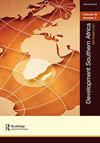Addressing the infrastructure maintenance gap while creating employment and transferring skills: An innovative institutional model
IF 1.3
4区 经济学
Q3 DEVELOPMENT STUDIES
引用次数: 0
Abstract
ABSTRACT The ‘social franchising’ model for the operation and maintenance of selected water and sanitation infrastructure, the conceptual origins of the model, its subsequent development by desktop research methods, and its piloting in the field, are described. Piloted in South Africa by a team with extensive experience of water and sanitation infrastructure and business development, the model has since been rolled out to scale, simultaneously bringing about (i) the servicing of selected infrastructure, returning it to full use, and (ii) micro-business development and nurturing, job creation, and skills development. Development and implementation of the model over two decades have demonstrated its robust nature compared to equivalent stand-alone micro-businesses, how it can partner in schools to improve health and hygiene education, and the effectiveness of the work it has done on infrastructure servicing and to accomplish tasks other than basic maintenance.在创造就业和转移技能的同时解决基础设施维护差距:一种创新的制度模式
摘要:本文描述了“社会特许经营”模式对选定的水和卫生基础设施的运营和维护,该模式的概念起源,其通过桌面研究方法的后续发展,以及在该领域的试点。该模式由一个在供水和卫生基础设施及商业发展方面具有丰富经验的团队在南非进行了试点,此后得到了大规模推广,同时实现了(1)对选定基础设施的服务,使其恢复充分使用,以及(2)微型企业的发展和培育、创造就业机会和技能发展。二十年来,该模式的发展和实施表明,与同类的独立微型企业相比,它具有强大的性质,它如何与学校合作,改善健康和卫生教育,以及它在基础设施服务和完成基本维护以外的任务方面所做的工作的有效性。
本文章由计算机程序翻译,如有差异,请以英文原文为准。
求助全文
约1分钟内获得全文
求助全文
来源期刊

Development Southern Africa
DEVELOPMENT STUDIES-
CiteScore
4.20
自引率
7.10%
发文量
42
期刊介绍:
The Development Southern Africa editorial team are pleased to announce that the journal has been accepted into the Thomson Reuters (formerly ISI) Social Science Citation Index. The journal will receive its first Impact Factor in 2010. Development Southern Africa offers a platform for expressing views and encouraging debate among development specialists, policy decision makers, scholars and students in the wider professional fraternity and especially in southern Africa. The journal publishes articles that reflect innovative thinking on key development challenges and policy issues facing South Africa and other countries in the southern African region.
 求助内容:
求助内容: 应助结果提醒方式:
应助结果提醒方式:


